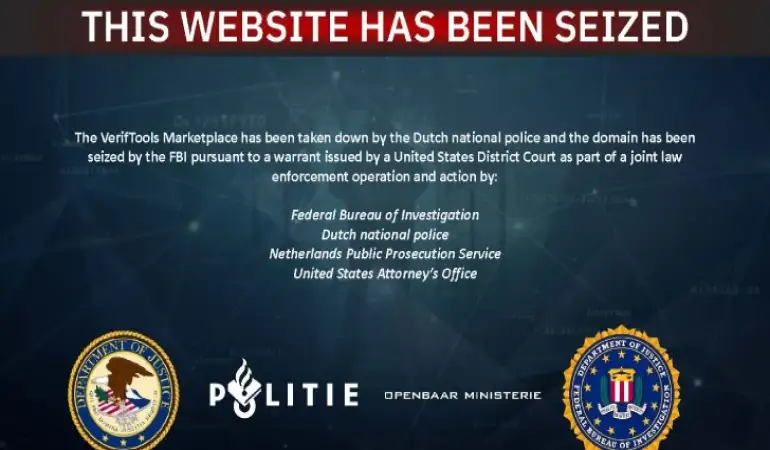Feds Shut Down “VerifTools,” a One-Stop Fake-ID Factory — Servers and Domains Seized
VerifTools, a widely used online service for generating forged identification documents, has been dismantled in a major enforcement operation involving U.S. and Dutch authorities. The investigation culminated in the seizure of key domains and the imaging of server infrastructure in Amsterdam.
August 29, 2025 15:44
What Happened — Timeline and Takedown
-
Late August 2025: In a multi-jurisdictional action, U.S. federal agents and Dutch cybercrime teams coordinated to dismantle VerifTools.
-
Authorities in the Netherlands secured two physical servers and over twenty virtual servers in an Amsterdam data center, mirroring the entire platform's backend.
-
At the same time, U.S. officials seized VerifTools’ primary domains and associated blog, replacing them with official seizure notices.
How the Platform Worked
VerifTools operated through a deceptively simple interface: users would upload a selfie, enter any personal details they wished, and instantly receive a generated image of a falsified ID—ranging from driver’s licenses and passports to residency permits. These forged documents were engineered to slip past online identity and age verification systems used by banks, fintech firms, crypto exchanges, and other regulated services.
Payment for the service was handled through cryptocurrencies, allowing anonymity and ease of transaction for users around the world.
The Scale of the Operation
Investigators estimate that VerifTools generated millions of dollars in illicit revenue. Reports suggest counterfeit IDs were sold for as little as $9, and the platform offered documents for all U.S. states and several foreign countries.
The infrastructure housed in the Netherlands alone is believed to have facilitated over €1 million in revenue. Altogether, this represents one of the largest known online marketplaces for fake ID distribution.
Agencies Behind the Operation
-
The FBI’s field office in Albuquerque led U.S. federal efforts, supported by the Department of Justice and international legal collaboration.
-
In the Netherlands, the Rotterdam Cybercrime Team and the Dutch expertise center on identity fraud and documents (ECID) were instrumental in identifying and isolating the platform’s infrastructure.
-
Additional leads and support reportedly came from Welsh law enforcement, linking VerifTools activity to broader fraud networks.
The Significance
VerifTools wasn’t just another dark web service—it enabled a wide array of crimes, including:
-
Account takeovers
-
Phishing and help-desk scams
-
Welfare and benefits fraud
-
Rental and tenancy fraud
-
Age-gate circumvention for minors or restricted content
The seizure of both the front-end and back-end infrastructure cuts off a major supply of forged documents at its source and grants authorities invaluable data for tracking operators and customers. Prosecutors have signaled that arrests are possible as analysis of the mirrored servers progresses.
What’s Next
-
Forensics: Investigators are combing through seized data to uncover identities behind VerifTools operators, payment flows, and customer networks.
-
Downstream investigations: Many victims of identity theft or online fraud may trace their losses back to documents generated by VerifTools. These cases could lead to further indictments.
-
Industry response: The case underscores the inadequacy of relying solely on static image checks. Firms should accelerate adoption of dynamic security measures—such as liveness detection, device fingerprinting, behavioral analysis, and cryptographic document validation—to mitigate similar threats in the future.
In Summary
-
VerifTools was taken offline in a coordinated raid targeting both domains and hosting servers.
-
It enabled the creation and sale of forged IDs at scale, generating significant illegal revenue.
-
Seized infrastructure opens the door for follow-up investigations and arrests.
-
The incident highlights a critical need for more robust, multi-layered identity verification systems across industries.
